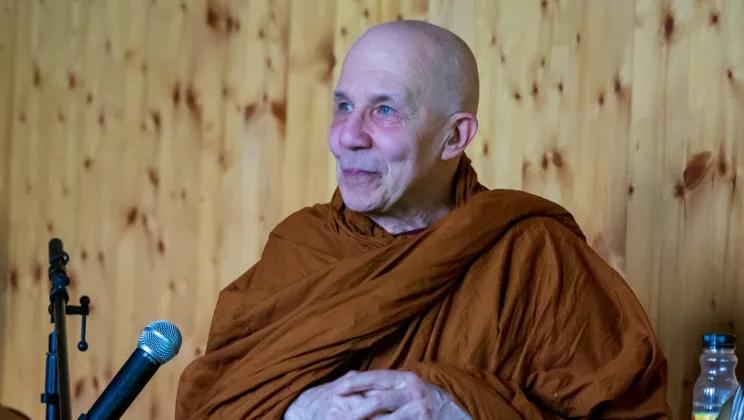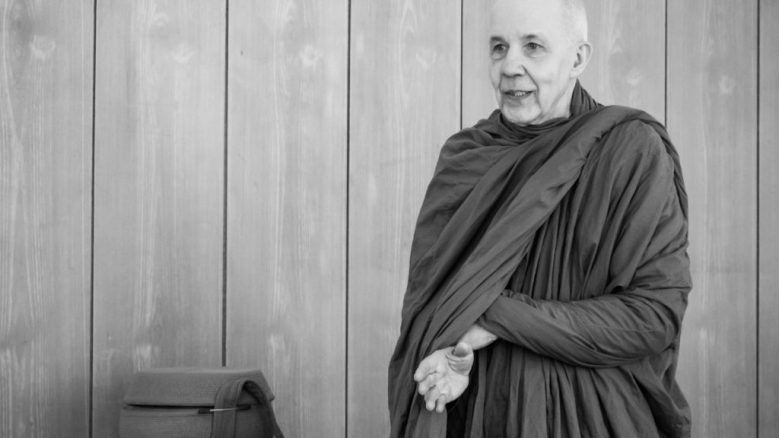Tags

Míša Laušmanová from Buddha Mangala asked the venerable Ashin Ottama for a few words about the current “coronavirus” crisis. Below you will find his talk about veils, insight and the necessary bit of mud for lotuses, and finally about eventual liberation from the fear (not only) of death.

Ashin Ottama in Jablonná nad Orlicí (May, 2019)
Miša came up with an idea for me to express something in the current shifted situation. So far, I have only done this once – at that time, Mazec was in the former Yugoslavia and there was a heated discussion going around the world about whether to bomb the aggressor or not – my statement then was not typical ‘for’ or ‘against’, rather it offered a different point of view on the whole situation. Perhaps I could try something similar this time.
I don’t want to get involved in mundane measures against the virus, information changes a lot every other day, the exchange of knowledge about the infection between countries does not work very well and even professional virologists do not agree. But one is only now realizing that influenza, generally speaking, is a really dangerous disease for the aged and infirm, and I did not know that; The corona virus only confirmed it – Covid19 is not just a flu, it’s a stupid flu. Minimizing or panicking only makes the situation confusing and won’t help. There is great inconsistency in the matter of the announced measures – closing of shops, businesses, curfew and so on. I have the impression that the criterion for the harshness of the measures should mainly be the capacity of the hospitals. Specialists warn that harsh measures also have a very bad impact on the nation in the long term. What everyone will surely agree on is that measures against the virus should not cause more damage, complications and suffering than the virus itself. But that’s a nice saying; after the battle everyone is a general…
I liked the attitude of the Czech Republic: masks. The world health organizations did not recommend it, they kept saying that it would not protect anyway – and the Czechs went their own way and in public. Now the world is copying it after the Czech Republic, even the folk creativity of domestic production. Somehow the world organizations couldn’t understand that a piece of T-shirt in front of the mouth does not protect the individual himself, but it does protect others – because we don’t know if we are silent carriers and spreaders of the disease. With the mask, we also show respect for the hospital staff, who sometimes can’t handle it as it is – and we definitely don’t want to add more infected seniors to them (like me – I have 73 orbits around the sun, and that’s something to say).
Today we wondered why some areas have so many severe problems (USA, Britain…), and others seem to be more or less normal – for example India, where people are crammed together without hygiene and disinfection. Today, Peter, who has lived there for a long time, wrote to me that the whole of India was suddenly imposed by the government into a full quarantine, so that people could not even buy anything for the first few days, and that the situation there continues to be like this – so there, too, vigorous steps were taken and they continue to act… – it cannot be trivialized, the virus is a monster, no matter how it got into people. A period of crisis can then be expected. But with this view, I would end the meaningful reflection on the pandemic, because everything else would be mere speculation. Most people’s minds tend to look negatively, mostly excessively negatively, into the future, and this weakens us mentally, spiritually, psychologically and physically (even if it were to be true).
I’m slowly getting to the point. In one Buddhist story, a dying king passes on his life experience to his son: ‘Don’t look too close and don’t look too far’ and dies. This now appeared to me to be the most appropriate approach to the current virus situation, but also in life in general: with an exclusive only ‘here-and-now’ you can possibly have a happy life, but you will eventually also end up under the bridge soon; and again, with exaggerated, overloaded speculations about the possible distant future, you will only get entangled in endless loops of worry, fear and helplessness.
Approach situations with maximum intelligence, which includes everything valuable: personal experience, experience and knowledge of others, quick foresight, courage to experiment, ability to quickly adapt to changing circumstances, mental qualities of life sensitivity, reasonableness and non-attachment, and so on. And, of course, the ability to ‘endure a lot’ is also important – but it has two components, even if only the first one is mistakenly considered. Being able to clench your teeth has its own justification, but the second is actually more important – being able to let go (or at least let go) of resistance to the situation and the accompanying feeling. It is intuitively quite clear to people, they somehow know it, but only Buddhism speaks clearly and distinctly about this centrally important ability.
In the Dhamma we also find purely worldly instructions, recommendations and advice. But these are derived not only from normal life experience, but much more from a great overview and insight into the very essence of existence. Wisdom is always some perspective, a view of the whole, some kind of emergence from a purely personal momentary situation. It is this circumstance that is specific to the Buddha’s teaching; in contrast to philosophies, with the Buddha it is also a certain emergence.
We probably remember school videos, where in the shot from above, maybe someone is sitting at a table with lemonade – and suddenly the reverse zoom starts, an ever greater overview: neighbors and neighboring houses, streets, neighborhoods, cities, countries, continents, globes , the solar system, our ‘milky’ galaxy, the universe – this is an overview in the 3D category. In Buddhism, at least, it is a 4D perspective – that means the whole thing is also in the infinity of time. But in the Buddha’s teaching, it is even more about the overview “xD”, which also includes all essential consciousness, where man, the universe, infinity and the whole of samsara take place. From this perspective, Covid-19 is still what it is, but the whole topic gets a different framing.
Buddhist insight is not just the ‘sunny’ samatha attitude of leaving ‘dirt’ behind, nor just the vipassana attitude of detachment. From that big overall perspective, all the ‘pros’ and ‘cons’ somehow blend, complement each other and neutralize each other into the relaxed calm and harmony of the middle balanced position: every “evil” is good for something – even if we don’t want to be. In a way, good and evil actually end here.
We know it from life: hardships stir the stagnant mud at the bottom of our pond; usually then the sluice gate will release a little of the heated sludge, so that clean, cold water will flow into the pond. I take it this way: On our personal human level, every hardship can be used for something good – that’s the central thing I wanted to remind all of us here. On a full spiritual journey, it’s about emptying the whole pond, removing the mud, and standing on your own feet (- Phoenix from the ashes) – but for that you need the right time. Whether we plant lotuses in clean water or not is another matter, a chapter for Bodhisattvas: lotuses need at least a little mud…
From that overall perspective, if it is experienced intensely enough, the fear of death disappears – primarily one’s own, but also indirectly a little bit of the death of others. The very experience of this dimension tends to be very personal and individual. I accidentally caught a rare lecture-talk by Luboš Vojtěch from Lotus on the Internet, who told about it from his own experience. A clear spiritual practice usually leads to this; just following a religion helps a little, but it’s not enough. Whether we call it Enlightenment or not, it really doesn’t matter.
The doctrine of rebirth in Buddhism or knowledge of the afterlife in other systems will certainly help this freedom from fear, but the experience itself is completely different, immediate; the central personal paradigm shift takes place outside of thinking. Everything is exactly as it was before, only now there is a lot of freedom and voluntariness around everything. There is sometimes a feeling of total surprise that nothing needs to be different than the way it is. I used to have one meditation in that direction, then I would walk around and try to sense what had actually changed. It confused me that everything was exactly as before. I didn’t manage to clarify it in any way at the time, it couldn’t be defined. From a Dhamma point of view, one could perhaps say that it is about letting go of clinging and clinging to one’s own mind and its creations, it is about being free flowing and taking one’s own mind with a grain of salt: it is only a mental organ that needs to be cleansed and exercised because this organ creates our happiness and unhappiness, occasionally turns a mosquito into a camel, etc. It is the ‘room with six windows’ where we spend this entire life. That spiritual overcoming of the fear of death is a completely positive, highly enriching gift – even compassion takes on a new, deeper dimension – that’s what’s special about it.
So that’s the overview and spiritual perspective on the coronavirus pandemic. Let’s act wisely and smartly, let’s protect ourselves to protect others. It can be assumed that there will be some economic hardship after the pandemic – so be mentally prepared for that too – and keep a kind mind, towards yourself and others.
Miša originally wanted some too new video – it will take a lot of work. But I have now revised the older long one “NDE and Buddhism” video, I shortened it by an hour, added a little, and fixed it Czech subtitles. I can recommend it, it is on Youtube under the new name “NDE: The nature and significance of Near Death Experiences”.
Ashin Ottama
Talking in English on the topic of near-death experiences (Czech subtitles can be turned on in the settings)
